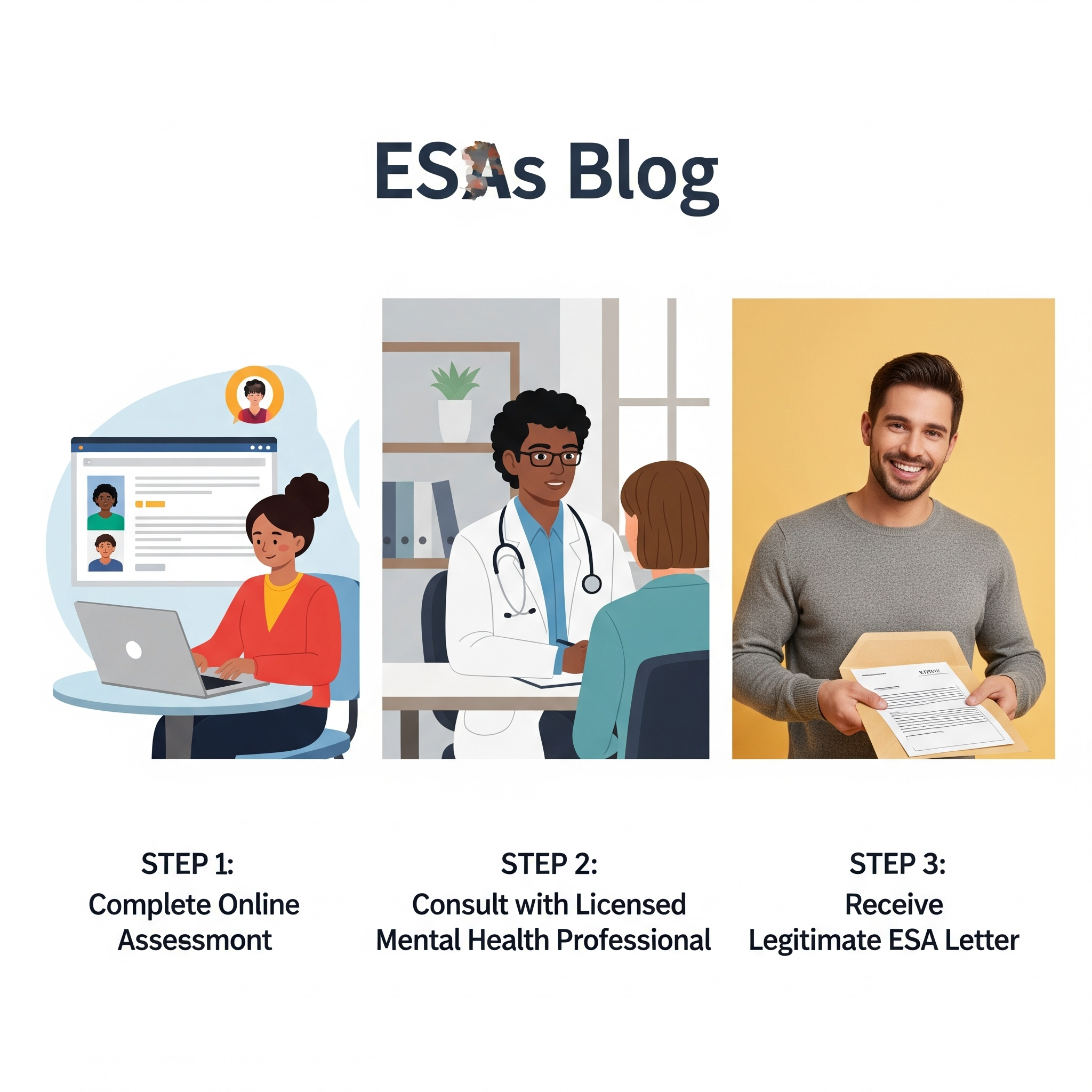Protecting Your Rights and Ensuring Legitimate Support
In the journey toward improved mental well-being, many individuals find profound comfort and assistance in the companionship of Emotional Support Animals (ESAs) and Psychiatric Service Dogs (PSDs). These animals, more than just pets, play a vital role in mitigating symptoms of various mental health conditions. However, the process of officially recognizing an ESA or PSD requires careful navigation, and perhaps the most crucial step is securing a legitimate letter from a licensed mental health professional (LMHP).
At CertifyESA, we are committed to upholding the highest standards of ethical practice and legal compliance. We understand that in the online landscape, it can be challenging to discern legitimate services from those that might put your rights at risk. This blog aims to illuminate precisely why relying solely on licensed mental health professionals for your ESA or PSD letter is not just a recommendation, but a fundamental necessity for your protection and peace of mind.
The Legal Landscape: Why Legitimacy Matters
Federal laws like the Fair Housing Act (FHA) and the Americans with Disabilities Act (ADA) provide crucial protections for individuals with disabilities who rely on assistance animals. However, these protections are explicitly tied to the legitimacy of the animal’s role in mitigating a disability. This legitimacy is primarily established through documentation from a qualified healthcare provider.
Fair Housing Act (FHA) and ESAs
The FHA prohibits discrimination in housing against individuals with disabilities, including those who require an ESA. Under the FHA, landlords must provide reasonable accommodations for tenants with ESAs, even in “no-pet” housing, and cannot charge pet fees or deposits (U.S. Department of Housing and Urban Development, 2020).
However, to qualify for these accommodations, you must provide a legitimate ESA letter. This letter must:
-
Be issued by a licensed mental health professional. This is paramount. The professional must be licensed to practice in the state where you receive services.
-
Confirm you have a mental or emotional disability. The letter must explicitly state that you have a qualifying mental health condition.
-
Explain how the ESA alleviates symptoms of your disability. It needs to establish a clear nexus between your disability and the need for the emotional support animal.
-
Be on official letterhead with the professional’s license number and contact information.
Without these elements, your letter may be considered invalid, leaving you vulnerable to eviction or denial of housing.
Americans with Disabilities Act (ADA) and PSDs
For Psychiatric Service Dogs, the ADA offers broader public access rights than the FHA grants to ESAs. PSDs are defined as dogs individually trained to do work or perform tasks for the benefit of an individual with a disability, including a psychiatric disability (U.S. Department of Justice, 2020). While the ADA does not require a letter for a service animal, having a PSD letter from an LMHP can provide significant peace of mind and help in situations where a landlord or airline may request documentation (Pettable, n.d.).
A PSD letter from an LMHP confirms:
-
You have an ADA-eligible mental health disability.
-
The need for a service animal to perform specific tasks related to that disability.
This documentation helps prevent accidental misrepresentation and maintains the integrity of legitimate service dog teams.
The Risks of Unlicensed Providers and “Fake” Letters
The internet is rife with websites promising “instant ESA letters” or “ESA registration” without a proper evaluation. These services often employ individuals who are not licensed mental health professionals or bypass the crucial assessment process. Engaging with such services carries significant risks:
-
Legal Consequences: Submitting a fraudulent ESA or PSD letter can lead to severe legal ramifications. In some states, misrepresenting an animal as an assistance animal is a misdemeanor, punishable by fines or even jail time (Azibo, 2024). Landlords can also pursue eviction for tenants who provide false information.
-
Denial of Accommodation: Landlords and airlines are increasingly savvy in identifying illegitimate letters. If your letter is not from a licensed professional or lacks the necessary components, your request for accommodation can be legally denied. This can leave you without housing or the ability to travel with your animal.
-
Financial Loss: You could waste money on a worthless letter. These “services” often charge fees for documents that hold no legal weight, leaving you out of pocket with no legitimate support.
-
Undermining the System: The proliferation of fake letters harms the entire community of individuals with legitimate disabilities who rely on ESAs and PSDs. It breeds skepticism among landlords and the public, making it harder for those truly in need to receive accommodations without undue scrutiny.
-
Lack of Clinical Appropriateness: An unlicensed provider cannot properly assess your mental health needs or determine if an ESA or PSD is truly the most beneficial intervention for you. A legitimate LMHP conducts a thorough evaluation to ensure the animal is clinically appropriate and aligns with your overall treatment plan.
The CertifyESA Difference: Partnering with Licensed Professionals
At CertifyESA, our model is built on integrity, ethical practice, and adherence to legal standards. We understand that your mental health is paramount, and obtaining a legitimate ESA or PSD letter is a serious step in your wellness journey. That’s why we exclusively partner with licensed mental health professionals.
Here’s what our commitment to licensed professionals means for you:
-
Clinical Expertise and Ethical Standards: Our network comprises licensed therapists, psychologists, psychiatrists, and other qualified mental health professionals who adhere to strict ethical guidelines. They possess the necessary education, training, and experience to conduct comprehensive mental health evaluations.
-
Thorough and Personalized Assessments: We do not offer “instant” letters. Instead, you undergo a personalized mental health assessment with a licensed professional. This evaluation determines if you meet the criteria for a mental or emotional disability and if an ESA or PSD is a necessary component of your treatment plan to alleviate your symptoms. This process ensures the recommendation is clinically sound and genuinely supports your well-being.
-
Legal Compliance and Confidence: Letters issued through CertifyESA are crafted to meet federal guidelines, specifically the Fair Housing Act requirements for ESAs. For PSDs, while not legally required, our professionals can provide letters that attest to your disability and the tasks your service dog performs, offering an additional layer of confidence and clarity.
-
State-Specific Knowledge: Our licensed professionals are knowledgeable about state-specific regulations that may impact ESA or PSD accommodations, such as states requiring a 30-day established client-provider relationship before issuing a letter (Pettable, n.d.).
-
Privacy and Confidentiality: Your mental health information is sensitive. Licensed professionals are bound by confidentiality laws (like HIPAA in the United States), ensuring your personal health information is protected throughout the process.
What a Legitimate Process Looks Like
When you seek an ESA or PSD letter through a reputable service like CertifyESA, here’s what you can expect:
-
Initial Screening/Intake: You’ll typically complete an online questionnaire or intake form providing basic information about your mental health history and your need for an assistance animal.
-
Consultation with a Licensed Professional: You will then be connected with a licensed mental health professional for a consultation. This consultation may occur via teletherapy (video or phone call), allowing for convenient and accessible care. During this session, the professional will assess your condition, discuss how an ESA or PSD could provide therapeutic benefits, and determine if you meet the diagnostic criteria for a disability that warrants an assistance animal.
-
Clinical Determination: Based on their clinical judgment and the information gathered during your assessment, the LMHP will determine if an ESA or PSD letter is medically appropriate for you.
-
Issuance of Letter (If Qualified): If you qualify, the licensed professional will issue a formal ESA or PSD letter on their official letterhead, including their license number, type of license, and date of issuance. This letter will clearly state your disability and how the animal mitigates its symptoms.
-
Ongoing Support (Optional): Some services, and many individual practitioners, may offer ongoing therapy or support, which can be beneficial for your overall mental health journey.
This structured, professional approach ensures that your ESA or PSD letter is not just a piece of paper, but a legitimate document backed by expert clinical assessment.
Don’t Compromise Your Rights
Choosing an Emotional Support Animal or Psychiatric Service Dog is a significant decision that can profoundly impact your mental well-being. The process of obtaining the necessary documentation should be treated with the same seriousness. Opting for services that bypass the involvement of licensed mental health professionals puts you at risk of legal complications, denial of accommodations, and the ethical compromise of your personal journey.
At CertifyESA, we believe in empowering individuals with genuine needs by providing access to ethical, legally compliant, and clinically sound services. By prioritizing the expertise of licensed mental health professionals, we ensure that your ESA or PSD letter is recognized, respected, and provides the legitimate support you deserve. Don’t compromise your rights or the integrity of your support animal – choose the path of professionalism and legitimacy.
APA Formatted Citations:
U.S. Department of Housing and Urban Development. (2020, January 28). Assessing a person’s request to have an animal as a reasonable accommodation under the Fair Housing Act. Retrieved from https://www.hud.gov/sites/dfiles/FHEO/documents/HUD_Guidance_on_ESA_01-28-2020.pdf
U.S. Department of Justice. (2020, July 1). Service animals. ADA.gov. Retrieved from https://www.ada.gov/resources/service-animals-2010-regulations/





